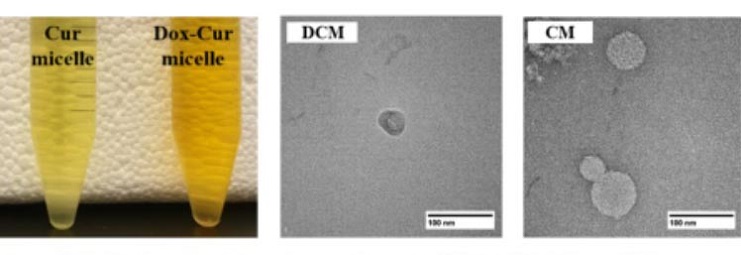Thailand medical researchers develop innovative therapeutic strategy to target leukemic stem cells in acute myelogenous leukemia
James Josh Fact checked by:Thailand Medical News Team Sep 03, 2024 7 months, 3 weeks, 2 days, 3 hours, 40 minutes ago
Thailand Medical: A New Hope for AML Treatment
In a groundbreaking development, a team of researchers from various esteemed institutions in Thailand has developed an innovative therapeutic strategy aimed at targeting leukemic stem cells (LSCs) to treat Acute Myelogenous Leukemia (AML). This
Thailand Medical News report discusses the study's findings, which have the potential to significantly enhance the effectiveness of AML treatments, offering new hope to patients battling this aggressive form of leukemia.
 Thailand medical researchers develop innovative therapeutic strategy to target leukemic stem cells in acute myelogenous leukemia. Physical appearance and morphologyof CM and DCM from TEM
Leukemic Stem Cells: The Root of the Problem
Thailand medical researchers develop innovative therapeutic strategy to target leukemic stem cells in acute myelogenous leukemia. Physical appearance and morphologyof CM and DCM from TEM
Leukemic Stem Cells: The Root of the Problem
AML is one of the most common and deadliest forms of leukemia, particularly affecting adults. It is characterized by the rapid growth of abnormal white blood cells that accumulate in the bone marrow and interfere with the production of normal blood cells. Despite advancements in chemotherapy and targeted therapies, AML remains a formidable challenge due to the presence of leukemic stem cells. These cells are a major cause of relapse and treatment resistance in AML patients.
Leukemic stem cells are a subset of cells within the leukemia population that possess the ability to self-renew and generate new leukemia cells. This makes them particularly difficult to eradicate with conventional therapies, which often target more differentiated leukemia cells but leave the stem cells untouched. As a result, many patients experience relapse even after achieving remission.
The Novel Therapeutic Approach
The Thai researchers, hailing from the Department of Medical Technology, Faculty of Associated Medical Sciences, Chiang Mai University; the School of Allied Health Sciences, University of Phayao; and the Department of Biochemistry, Faculty of Medicine, Chiang Mai University, have focused on developing a drug delivery system that specifically targets LSCs. The study highlights the use of doxorubicin-curcumin nanoparticles, conjugated with two different peptides, CKR and EVQ, that specifically target the FLT3 protein, a key marker found on the surface of LSCs in AML.
How It Works: Targeted Drug Delivery
The therapeutic strategy revolves around the use of polymeric micelles - a type of nanoparticle - loaded with a combination of doxorubicin (Dox) and curcumin (Cur). Doxorubicin is a well-known chemotherapy drug, while curcumin, a natural compound derived from turmeric, has shown potential in enhancing the effects of chemotherapy and reducing its side effects.
The key innovation lies in the modification of these micelles with peptides that specifically target the FLT3 protein, which is overexpressed in many AML cases. The FLT3 protein serves as a gateway for the micelles to deli
ver their payload directly to the LSCs, thereby increasing the drug concentration at the site of the leukemia while minimizing exposure to healthy cells. This targeted approach not only enhances the efficacy of the treatment but also reduces the systemic toxicity commonly associated with chemotherapy.
Study Findings: Promising Results
The study demonstrated that the doxorubicin-curcumin micelles, when conjugated with both CKR and EVQ peptides, showed significantly higher toxicity to leukemic stem cells in AML cell lines compared to micelles conjugated with either peptide alone or without any peptide. This dual-targeting approach increased the likelihood of the micelles binding to the FLT3 receptor on LSCs, leading to a more effective delivery of the drug.
Furthermore, the micelles exhibited excellent stability and prolonged drug release, ensuring a sustained therapeutic effect. The researchers also optimized the drug-to-polymer ratio in the micelles, which resulted in high encapsulation efficiency and loading capacity, making the formulation both effective and practical for potential clinical use.
Implications for AML Treatment
This innovative approach to targeting leukemic stem cells has the potential to overcome one of the biggest hurdles in AML treatment: relapse due to the survival of LSCs. By focusing on these root cells, the therapy could not only improve the chances of complete remission but also extend the duration of remission, reducing the likelihood of the disease returning.
Moreover, the combination of doxorubicin and curcumin offers a dual benefit. While doxorubicin attacks the DNA of cancer cells, curcumin acts as a chemosensitizer, enhancing the effect of the chemotherapy and mitigating its side effects. This combination could lead to more effective and less toxic treatment regimens for AML patients.
Conclusion: A Bright Future Ahead
The study's findings represent a significant step forward in the fight against AML. The innovative use of targeted nanoparticles to deliver chemotherapy drugs directly to leukemic stem cells offers a promising new avenue for treatment. While further research and clinical trials are necessary to confirm the efficacy and safety of this approach in patients, the potential benefits are substantial.
The study findings were published in the peer-reviewed journal: Polymers.
https://www.mdpi.com/2073-4360/16/17/2498
For the latest Medical Innovations, keep on logging to
Thailand Medical News.
Read Also:
https://www.thailandmedical.news/news/thailand-medical-researchers-find-that-phytochemicals-from-the-areca-nut-exhibit-anti-neuroinflammatory-properties
https://www.thailandmedical.news/news/thailand-medical-study-finds-agarwood-extracts-offer-neuroprotective-benefits-and-can-prevent-neurodegenerative-diseases
